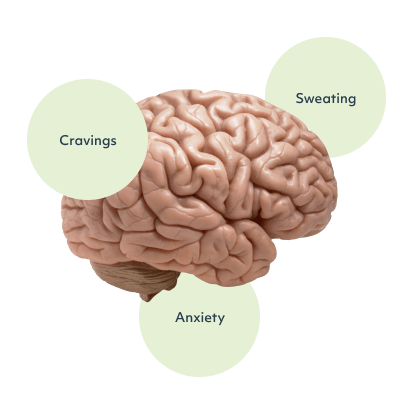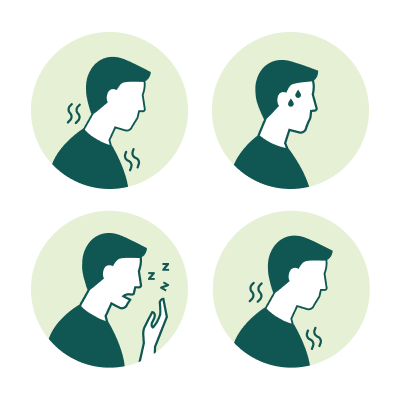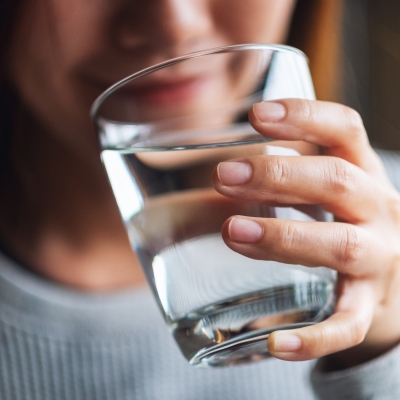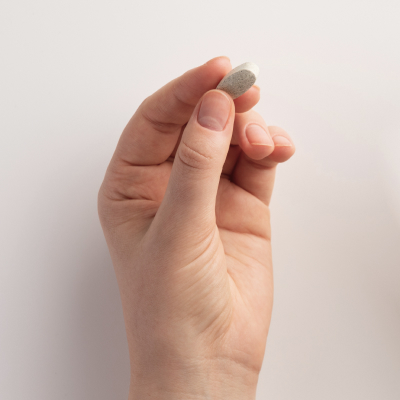Alcohol withdrawal can be scary, but being prepared can help.
Tap on a topic to learn more about alcohol withdrawal symptoms and treatment.

What does "alcohol withdrawal" really mean?
Alcohol withdrawal is a catchall term that refers to the group of symptoms that occur when someone suddenly stops or reduces their drinking—the time period that is commonly called detox. Withdrawal symptoms include psychological effects (like cravings and anxiety) and physical effects (like sweating and high blood pressure). While withdrawal is uncomfortable when someone stops many substances, alcohol withdrawal, in particular, brings serious medical risks.
The good news is that alcohol withdrawal is temporary. For most people, the worst is over in under a week.
The risks of alcohol detox
Since alcohol is readily available across the country, it’s common to think of it as safe. Even when problems with alcohol use disorder (often referred to as alcoholism or alcohol abuse) arise, many people think that they’ll be fine if they just stop drinking. To be clear, quitting drinking or moderating your alcohol intake is an excellent goal, and we support it. But it’s important to be aware of the risks of alcohol detox so you can be prepared if they crop up after you stop or reduce your drinking.
Many people detox from alcohol at home, but it is important to have trusted people check in regularly. Because there are health risks and a chance of death, people with a history of experiencing delirium tremens or withdrawal-induced seizures should seek medical supervision.

Alcohol withdrawal symptoms
Alcohol withdrawal symptoms can begin sooner than many people realize—usually less than 8 hours after the last drink. They can also occur days after stopping drinking.
The most severe symptoms of alcohol withdrawal include seizures and hallucinations, which manifest 1 to 2 days after withdrawal symptoms begin, and delirium tremens (DTs). DTs can develop between 1 and 4 days after withdrawal starts. They are characterized by disorientation and often include severe agitation, rapid heartbeat, high blood pressure, and fever. They can cause heart attack and stroke. About five percent of the patients who experience DTs die.
Common alcohol withdrawal symptoms
- Anxiety
- Headache
- Fatigue
- Irritability
- Shakiness or tremors
- Nausea
- Sweating
- Insomnia
- Rapid heart rate
Symptoms of delirium tremens
Delirium tremens (DTs) is very serious and dangerous, and can occur during alcohol withdrawal. DTs usually arise between 1 and 3 days after stopping drinking. Seek emergency medical care if these symptoms occur.
- Confusion/disorientation
- Agitation
- Fever
- Hallucinations (seeing, hearing, or feeling things that aren’t there)
- Seizures
- High blood pressure
- Loss of consciousness


Coping with withdrawal symptoms
If you’re detoxing at home (without medical supervision), your best option is to plan the kinds of comfort that usually help when you’re sick. If possible, stay in a quiet, calm environment away from disruptions. Keep hydrated with water and electrolyte drinks like coconut water or sports drinks. Wear comfortable clothing, and have changes of clothes available so you can change them if you get sweaty and chilled. Your appetite may be affected, but try to have small, frequent meals, like yogurt or soup. Music, television, books, or other forms of entertainment can help your thoughts from spiraling into negativity.
If you are undergoing medical supervision for your detox, your providers may prescribe medications to help ease the discomfort of withdrawal. Even if a home detox was the plan, anyone who begins to experience hallucinations or seizures should seek emergency medical assistance immediately.
Post-acute withdrawal syndrome
Many people experience withdrawal symptoms for a prolonged period of time, beyond the typical 1-2 week window. This extended process of withdrawal is called post-acute withdrawal syndrome (PAWS). PAWS often recurs periodically in episodes of a few days and can fluctuate in severity. These episodes can persist for up to two years. It is estimated that up to 75% of heavy drinkers who quit alcohol may experience PAWS to some extent.
Common symptoms of PAWS:
- Irritability
- Cravings
- Apathy
- Anxiety or panic
- Depression
- Insomnia
- Mood swings
- Low energy/fatigue
- Chronic pain
- Difficulty with cognitive tasks (remembering things, learning, problem-solving)
PAWS symptoms can be triggered or made more severe by stressful situations, but they can also recur without any obvious triggers. If PAWS causes you distress, speak with your healthcare provider.


Medication-assisted treatment for alcohol use disorder
There are FDA-approved medications that help to control alcohol cravings and stabilize long-term recovery.
Naltrexone
Acamprosate (Campral)
Acamprosate (Campral) is believed to act by correcting some of the brain changes caused by chronic alcohol consumption. Drinking affects some of the neurotransmitters that make you feel calm, and when you quit drinking you can feel poorly because of this. Acamprosate decreases these uncomfortable symptoms by affecting neurotransmitters in the brain that cause excitability. Acamprosate does not have a high potential addiction risk. Acamprosate is usually well tolerated. The main side effect may be diarrhea, which should be mild and usually passes quickly.
Medications for withdrawal
Some doctors prescribe medications to relieve the discomfort of alcohol withdrawal. These can include gabapentin and topiramate, which are intended for other purposes but have been discovered to be helpful for some people with alcohol use disorder. Your healthcare provider can also suggest over-the-counter medications to relieve discomfort from alcohol withdrawal symptoms.
Physicians may also prescribe benzodiazepines—diazepam, chlordiazepoxide (Librium), clonazepam (Klonopin), etc.—to those in withdrawal from alcohol use.
The benefits of quitting or moderating alcohol use
Physical health benefits
- No more hangovers to make your body suffer from aches, nausea, and dehydration.
- Support your natural, healthy immune system, which can be impeded by alcohol.
- Your cancer risk factors will go down.
- Digestive health can recover from the recurring nausea, diarrhea, acid reflux, and reduced ability to absorb nutrients that often result from heavy drinking.
- Your cardiovascular system can heal from the strain alcohol placed on it.
- Your sleep patterns have a chance to recover, with alcohol no longer disrupting your REM cycles.
Mental health benefits
- Your memory can improve, with alcohol no longer causing blackouts and mental fog.
- Your brain can recover from the damaging effects of alcohol.
- You will be able to feel a full range of emotions again.
Social health benefits
- Save money that you’re no longer spending on drinks, getting rides when you’ve been drinking, and impulsive purchases made while under the influence.
- Have more free time, once your day is no longer filled (or is less filled) with planning when you’ll be able to drink, getting alcohol, and consuming alcohol.
- Gain more control over your actions and choices, without the impairment of drinking to excess.






